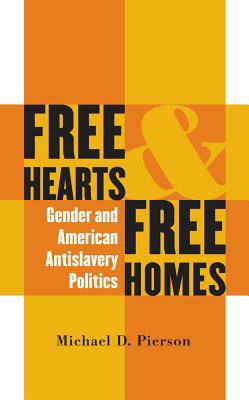
- Afhalen na 1 uur in een winkel met voorraad
- Gratis thuislevering in België vanaf € 30
- Ruim aanbod met 7 miljoen producten
- Afhalen na 1 uur in een winkel met voorraad
- Gratis thuislevering in België vanaf € 30
- Ruim aanbod met 7 miljoen producten
Zoeken
€ 64,95
+ 129 punten
Omschrijving
By exploring the intersection of gender and politics in the antebellum North, Michael Pierson examines how antislavery political parties capitalized on the emerging family practices and ideologies that accompanied the market revolution.
From the birth of the Liberty party in 1840 through the election of Republican Abraham Lincoln in 1860, antislavery parties celebrated the social practices of modernizing northern families. In an era of social transformations, they attacked their Democratic foes as defenders of an older, less egalitarian patriarchal world. In ways rarely before seen in American politics, Pierson says, antebellum voters could choose between parties that articulated different visions of proper family life and gender roles.
By exploring the ways John and Jessie Benton Frémont and Abraham and Mary Todd Lincoln were presented to voters as prospective First Families, and by examining the writings of Harriet Beecher Stowe, Lydia Maria Child, and other antislavery women, Free Hearts and Free Homes rediscovers how crucial gender ideologies were to American politics on the eve of the Civil War.
From the birth of the Liberty party in 1840 through the election of Republican Abraham Lincoln in 1860, antislavery parties celebrated the social practices of modernizing northern families. In an era of social transformations, they attacked their Democratic foes as defenders of an older, less egalitarian patriarchal world. In ways rarely before seen in American politics, Pierson says, antebellum voters could choose between parties that articulated different visions of proper family life and gender roles.
By exploring the ways John and Jessie Benton Frémont and Abraham and Mary Todd Lincoln were presented to voters as prospective First Families, and by examining the writings of Harriet Beecher Stowe, Lydia Maria Child, and other antislavery women, Free Hearts and Free Homes rediscovers how crucial gender ideologies were to American politics on the eve of the Civil War.
Specificaties
Betrokkenen
- Auteur(s):
- Uitgeverij:
Inhoud
- Aantal bladzijden:
- 268
- Taal:
- Engels
- Reeks:
Eigenschappen
- Productcode (EAN):
- 9780807854556
- Verschijningsdatum:
- 30/06/2003
- Uitvoering:
- Paperback
- Formaat:
- Trade paperback (VS)
- Afmetingen:
- 179 mm x 231 mm
- Gewicht:
- 367 g

Alleen bij Standaard Boekhandel
+ 129 punten op je klantenkaart van Standaard Boekhandel
Beoordelingen
We publiceren alleen reviews die voldoen aan de voorwaarden voor reviews. Bekijk onze voorwaarden voor reviews.











